2018级博士生生物医学研究论文导读与写作考试方式
- 格式:doc
- 大小:31.42 KB
- 文档页数:4
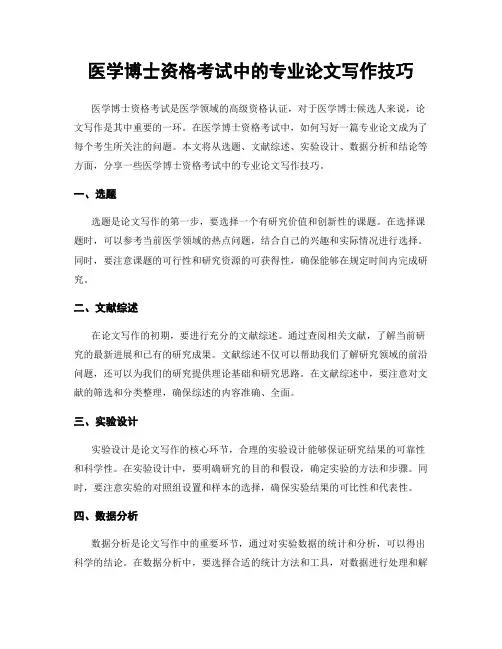
医学博士资格考试中的专业论文写作技巧医学博士资格考试是医学领域的高级资格认证,对于医学博士候选人来说,论文写作是其中重要的一环。
在医学博士资格考试中,如何写好一篇专业论文成为了每个考生所关注的问题。
本文将从选题、文献综述、实验设计、数据分析和结论等方面,分享一些医学博士资格考试中的专业论文写作技巧。
一、选题选题是论文写作的第一步,要选择一个有研究价值和创新性的课题。
在选择课题时,可以参考当前医学领域的热点问题,结合自己的兴趣和实际情况进行选择。
同时,要注意课题的可行性和研究资源的可获得性,确保能够在规定时间内完成研究。
二、文献综述在论文写作的初期,要进行充分的文献综述。
通过查阅相关文献,了解当前研究的最新进展和已有的研究成果。
文献综述不仅可以帮助我们了解研究领域的前沿问题,还可以为我们的研究提供理论基础和研究思路。
在文献综述中,要注意对文献的筛选和分类整理,确保综述的内容准确、全面。
三、实验设计实验设计是论文写作的核心环节,合理的实验设计能够保证研究结果的可靠性和科学性。
在实验设计中,要明确研究的目的和假设,确定实验的方法和步骤。
同时,要注意实验的对照组设置和样本的选择,确保实验结果的可比性和代表性。
四、数据分析数据分析是论文写作中的重要环节,通过对实验数据的统计和分析,可以得出科学的结论。
在数据分析中,要选择合适的统计方法和工具,对数据进行处理和解读。
同时,要注意数据的可靠性和可重复性,确保数据分析的结果具有科学性和可信度。
五、结论结论是论文写作的最后一步,要对研究结果进行总结和归纳。
在结论中,要回答研究的问题和验证研究的假设,指出研究的创新点和不足之处。
同时,要提出进一步的研究方向和展望,为相关领域的研究提供参考和启示。
综上所述,医学博士资格考试中的专业论文写作需要考生具备一定的科研能力和写作技巧。
在论文写作过程中,要选择合适的课题,进行充分的文献综述,合理的实验设计和数据分析,最终得出科学的结论。
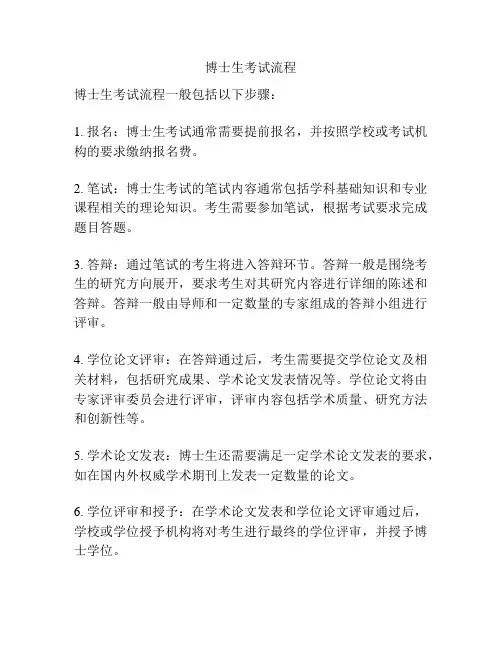
博士生考试流程
博士生考试流程一般包括以下步骤:
1. 报名:博士生考试通常需要提前报名,并按照学校或考试机构的要求缴纳报名费。
2. 笔试:博士生考试的笔试内容通常包括学科基础知识和专业课程相关的理论知识。
考生需要参加笔试,根据考试要求完成题目答题。
3. 答辩:通过笔试的考生将进入答辩环节。
答辩一般是围绕考生的研究方向展开,要求考生对其研究内容进行详细的陈述和答辩。
答辩一般由导师和一定数量的专家组成的答辩小组进行评审。
4. 学位论文评审:在答辩通过后,考生需要提交学位论文及相关材料,包括研究成果、学术论文发表情况等。
学位论文将由专家评审委员会进行评审,评审内容包括学术质量、研究方法和创新性等。
5. 学术论文发表:博士生还需要满足一定学术论文发表的要求,如在国内外权威学术期刊上发表一定数量的论文。
6. 学位评审和授予:在学术论文发表和学位论文评审通过后,学校或学位授予机构将对考生进行最终的学位评审,并授予博士学位。
需要注意的是,不同学校和学科的博士生考试流程可能会有一定差异,具体流程还需结合相关学校或考试机构的规定来确定。
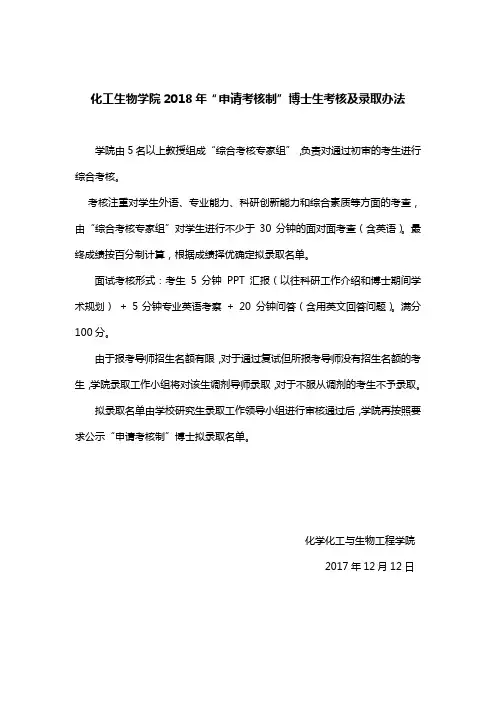
化工生物学院2018年“申请考核制”博士生考核及录取办法
学院由5名以上教授组成“综合考核专家组”,负责对通过初审的考生进行综合考核。
考核注重对学生外语、专业能力、科研创新能力和综合素质等方面的考查,由“综合考核专家组”对学生进行不少于30分钟的面对面考查(含英语)。
最终成绩按百分制计算,根据成绩择优确定拟录取名单。
面试考核形式:考生5 分钟PPT 汇报(以往科研工作介绍和博士期间学术规划)+ 5分钟专业英语考察+ 20 分钟问答(含用英文回答问题)。
满分100分。
由于报考导师招生名额有限,对于通过复试但所报考导师没有招生名额的考生,学院录取工作小组将对该生调剂导师录取,对于不服从调剂的考生不予录取。
拟录取名单由学校研究生录取工作领导小组进行审核通过后,学院再按照要求公示“申请考核制”博士拟录取名单。
化学化工与生物工程学院
2017年12月12日
化工生物学院2018年“申请考核制”博士生复试安排
化学
时间:12月15日(周五) 13:00
地点:化工楼4091
生物材料学
时间:12月15日(周五) 13:00
地点:化工楼4092
纺织化学与染整工程
时间:12月15日(周五) 13:00
地点:化工楼4080
每位同学准备不少于5分钟的PPT汇报,请带好相关申请材料的原件。
备注:复试名单以学院通知为准。
化学化工与生物工程学院
2017年12月12日。

基础医学院年博士研究生招生考试复试方案
学院(所)详细地址:首都医科大学校本部北京丰台区右安门外西头条号。
联系人:吕建祎联系电话:电子邮箱:其他需要向考生说明的注意事项:请考生携带复试资格审核材料。
1 / 8
基础医学院年博士研究生招生考试复试方案
学院(所)详细地址:首都医科大学校本部北京丰台区右安门外西头条号。
联系人:王可联系电话:电子邮箱:
其他需要向考生说明的注意事项:请考生携带复试资格审核材料。
2 / 8
基础医学院年博士研究生招生考试复试方案
学院(所)详细地址:首都医科大学校本部北京丰台区右安门外西头条号。
联系人:陆莉联系电话:电子邮箱:
其他需要向考生说明的注意事项:请考生携带复试资格审核材料。
3 / 8
基础医学院年博士研究生招生考试复试方案
学院(所)详细地址:首都医科大学校本部北京丰台区右安门外西头条号。
联系人:张楠联系电话:电子邮箱:其他需要向考生说明的注意事项:请考生携带复试资格审核材料。
4 / 8。
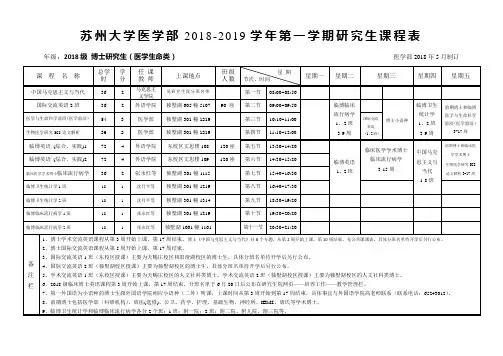
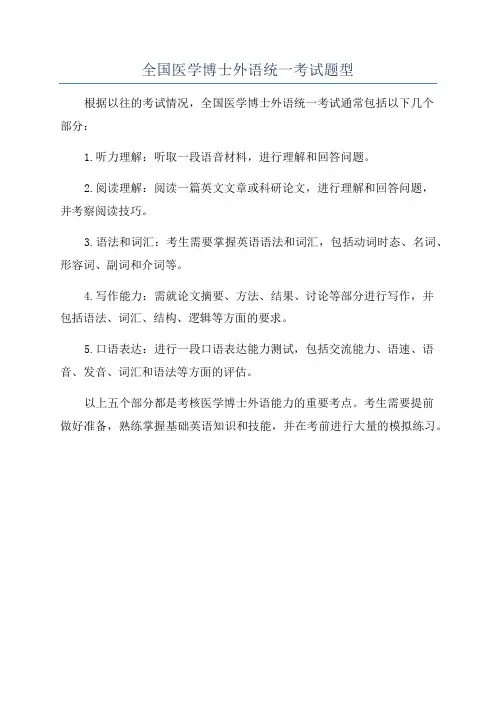
全国医学博士外语统一考试题型
根据以往的考试情况,全国医学博士外语统一考试通常包括以下几个
部分:
1.听力理解:听取一段语音材料,进行理解和回答问题。
2.阅读理解:阅读一篇英文文章或科研论文,进行理解和回答问题,
并考察阅读技巧。
3.语法和词汇:考生需要掌握英语语法和词汇,包括动词时态、名词、形容词、副词和介词等。
4.写作能力:需就论文摘要、方法、结果、讨论等部分进行写作,并
包括语法、词汇、结构、逻辑等方面的要求。
5.口语表达:进行一段口语表达能力测试,包括交流能力、语速、语音、发音、词汇和语法等方面的评估。
以上五个部分都是考核医学博士外语能力的重要考点。
考生需要提前
做好准备,熟练掌握基础英语知识和技能,并在考前进行大量的模拟练习。
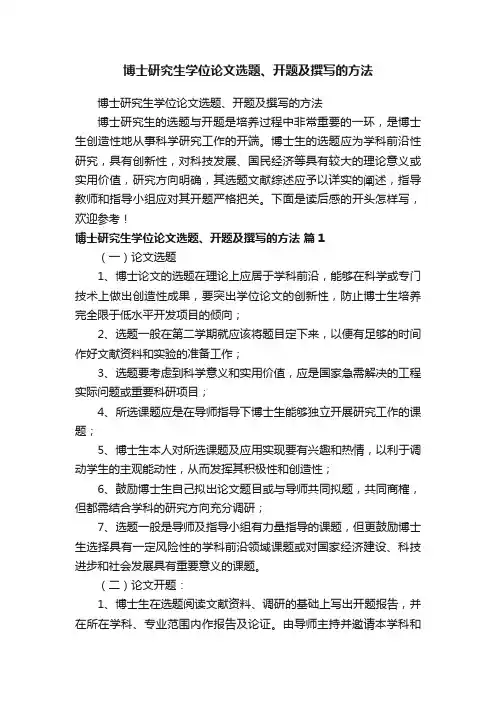
博士研究生学位论文选题、开题及撰写的方法博士研究生学位论文选题、开题及撰写的方法博士研究生的选题与开题是培养过程中非常重要的一环,是博士生创造性地从事科学研究工作的开端。
博士生的选题应为学科前沿性研究,具有创新性,对科技发展、国民经济等具有较大的理论意义或实用价值,研究方向明确,其选题文献综述应予以详实的阐述,指导教师和指导小组应对其开题严格把关。
下面是读后感的开头怎样写,欢迎参考!博士研究生学位论文选题、开题及撰写的方法篇1(一)论文选题1、博士论文的选题在理论上应居于学科前沿,能够在科学或专门技术上做出创造性成果,要突出学位论文的创新性,防止博士生培养完全限于低水平开发项目的倾向;2、选题一般在第二学期就应该将题目定下来,以便有足够的时间作好文献资料和实验的准备工作;3、选题要考虑到科学意义和实用价值,应是国家急需解决的工程实际问题或重要科研项目;4、所选课题应是在导师指导下博士生能够独立开展研究工作的课题;5、博士生本人对所选课题及应用实现要有兴趣和热情,以利于调动学生的主观能动性,从而发挥其积极性和创造性;6、鼓励博士生自己拟出论文题目或与导师共同拟题,共同商榷,但都需结合学科的研究方向充分调研;7、选题一般是导师及指导小组有力量指导的课题,但更鼓励博士生选择具有一定风险性的学科前沿领域课题或对国家经济建设、科技进步和社会发展具有重要意义的课题。
(二)论文开题:1、博士生在选题阅读文献资料、调研的基础上写出开题报告,并在所在学科、专业范围内作报告及论证。
由导师主持并邀请本学科和其它学科的专家参加评议,专家人数一般不少五人;2、开题报告应包括以下内容:(1)课题的研究意义,对国内外研究现状、发展趋势等的分析;(2)课题的研究目标、研究内容、拟解决的关键问题;(3)课题拟采取的研究的方法和手段、技术路线、实验方案及可行性分析等;(4)课题的创新之处;(5)课题的研究计划及预期进展、预期成果;(6)与课题有关的研究工作已取得的成果和已具备的实验条件等;(7)论文工作量估计与研究经费的预算和落实情况。
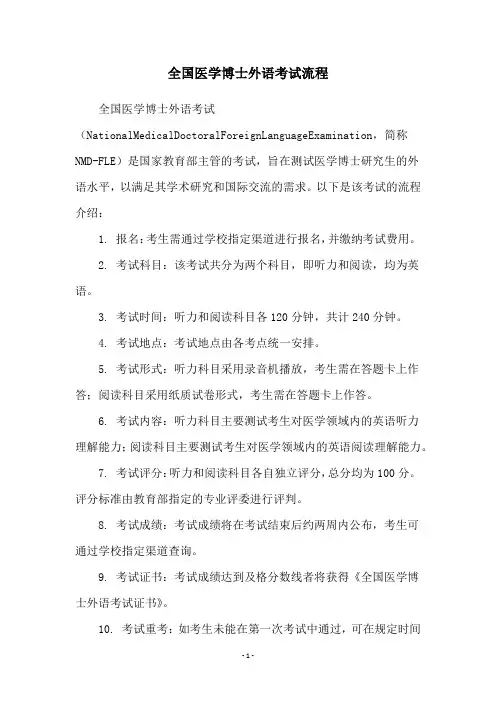
全国医学博士外语考试流程
全国医学博士外语考试(NationalMedicalDoctoralForeignLanguageExamination,简称NMD-FLE)是国家教育部主管的考试,旨在测试医学博士研究生的外
语水平,以满足其学术研究和国际交流的需求。
以下是该考试的流程介绍:
1. 报名:考生需通过学校指定渠道进行报名,并缴纳考试费用。
2. 考试科目:该考试共分为两个科目,即听力和阅读,均为英语。
3. 考试时间:听力和阅读科目各120分钟,共计240分钟。
4. 考试地点:考试地点由各考点统一安排。
5. 考试形式:听力科目采用录音机播放,考生需在答题卡上作答;阅读科目采用纸质试卷形式,考生需在答题卡上作答。
6. 考试内容:听力科目主要测试考生对医学领域内的英语听力
理解能力;阅读科目主要测试考生对医学领域内的英语阅读理解能力。
7. 考试评分:听力和阅读科目各自独立评分,总分均为100分。
评分标准由教育部指定的专业评委进行评判。
8. 考试成绩:考试成绩将在考试结束后约两周内公布,考生可
通过学校指定渠道查询。
9. 考试证书:考试成绩达到及格分数线者将获得《全国医学博
士外语考试证书》。
10. 考试重考:如考生未能在第一次考试中通过,可在规定时间
内申请重考。
重考次数不得超过两次。
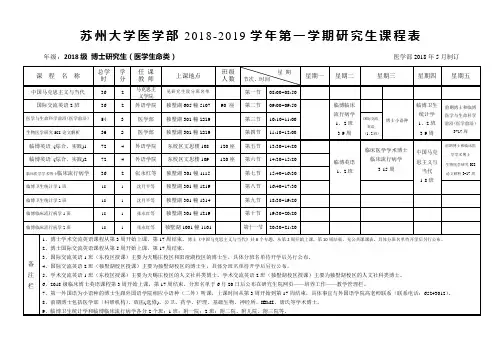
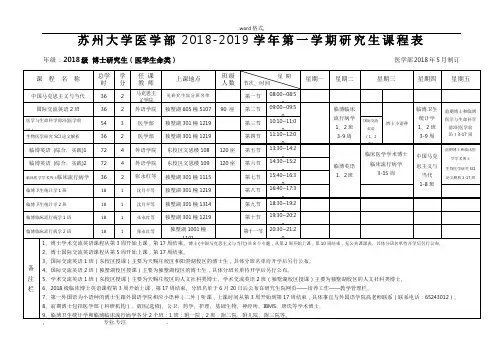
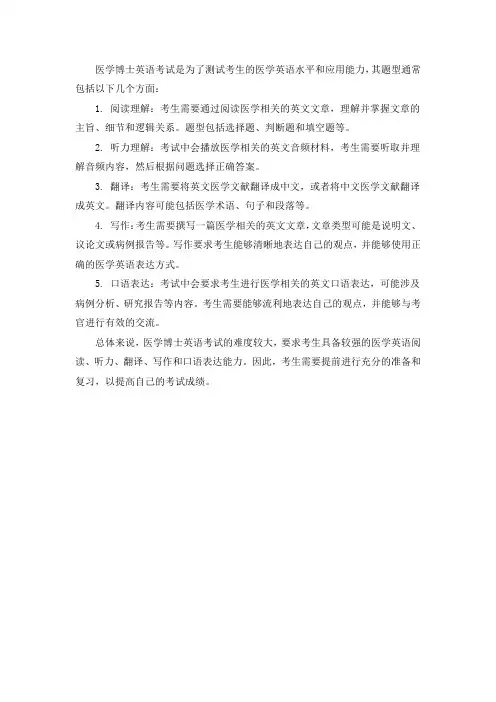
医学博士英语考试是为了测试考生的医学英语水平和应用能力,其题型通常包括以下几个方面:
1. 阅读理解:考生需要通过阅读医学相关的英文文章,理解并掌握文章的主旨、细节和逻辑关系。
题型包括选择题、判断题和填空题等。
2. 听力理解:考试中会播放医学相关的英文音频材料,考生需要听取并理解音频内容,然后根据问题选择正确答案。
3. 翻译:考生需要将英文医学文献翻译成中文,或者将中文医学文献翻译成英文。
翻译内容可能包括医学术语、句子和段落等。
4. 写作:考生需要撰写一篇医学相关的英文文章,文章类型可能是说明文、议论文或病例报告等。
写作要求考生能够清晰地表达自己的观点,并能够使用正确的医学英语表达方式。
5. 口语表达:考试中会要求考生进行医学相关的英文口语表达,可能涉及病例分析、研究报告等内容。
考生需要能够流利地表达自己的观点,并能够与考官进行有效的交流。
总体来说,医学博士英语考试的难度较大,要求考生具备较强的医学英语阅读、听力、翻译、写作和口语表达能力。
因此,考生需要提前进行充分的准备和复习,以提高自己的考试成绩。
2018 年仁济医院博士研究生复试办法第一部分:学术型博士、专业型博士(普专)组织形式:(一)笔试:专业课笔试有专业外语、专业知识,为书面考试,考试时间3小时。
(二)面试:面试共分科研计划书汇报、外语口语和听力、专业素质和能力及综合素质和能力考核部分。
第一阶段:4月20日- 4月24日下午17:00之前(第一志愿首轮复试)第二阶段: 4月25日-4月26日下午17:00之前(仁济医院院内调剂复试)(三)复试通知:由各复试小组直接通知考生(含已通过硕博连读资格考试的学生)本人参加复试。
通知内容包括具体的复试时间、地点及要求等,参见附件“发面试学生邮件供参考2018”。
(四)复试验证:参加复试的考生须按要求提交材料。
复试现场当场提交给复试秘书老师查验。
对持不合格证件的考生不准参加复试。
未经查验证件擅自参加复试者,一经查实,其复试成绩无效。
复试所需材料均以交医研招办官网要求为准。
(五)复试结果:按总分(综合评分+专业课成绩+综合面试成绩)由高到低录取,笔试或面试成绩不及格(低于60分)者不得录取(六)调剂:按交医研招办的相关规定执行。
仁济院内调剂阶段有调剂需要者,请于2018年4月24日下午17时之后电联021-王老师咨询。
(七)实施招生承诺制:交大医学院继续实施招生承诺,承诺书不作为录取依据。
在招生过程中要求导师和考生必须分别签订招生承诺书。
主要内容包括:导师对研究生的资助责任和培养责任作出承诺,考生则必须对医学院的录取规定和培养要求作出承诺。
(八)注意事项:请考生收到复试通知后准时参加复试,逾期不参加者将视为放弃此次复试,不再另行通知。
(九)联系方式:仁济医院科研处,上海市浦东新区浦建路160号行政楼207室,王老师一、复试名单二、复试安排第二部分:“临-专”博士一、组织形式:(一)笔试:专业课笔试有专业外语、专业知识,为书面考试,考试时间3小时。
(二)面试:面试共分科科研计划书汇报、外语口语和听力、专业素质和能力,及综合素质和能力考核部分。
全国医学博士外语统一考试大纲全国医学博士外语统一考试(NMLE)是中国博士研究生入学考试中的一项,旨在测试考生在医学领域外语能力的水平,以达到在国际化背景下进行医学研究和交流的要求。
考试包括听力、阅读、写作三部分。
一、听力部分听力考试主要测试考生对语音、语调、语速和语音连贯性的理解程度。
考试分为两节,每节20道题。
建议考生在平时练习时,注重提高听力理解能力,多听力和口语训练。
二、阅读部分阅读考试主要测试考生对英语阅读理解的能力。
考试分为两节,每节15道题,每题单词量平均在20个左右。
英语阅读能力是医学研究的重要基础,建议考生平时多读英文科技文献。
三、写作部分写作考试主要测试考生的英语表达能力和学术写作能力。
考试分为两部分,第一部分要求考生写一篇400-500个单词的学术文章摘要,第二部分要求考生写一篇400-500个单词的学术文章,论文题目一般涉及医学领域的热点问题。
建议考生多练习写作,多阅读英文学术文献和科技报道。
参考内容:1. 英语听力材料:建议考生学习BBC news,TED Talks,并注重学习新闻报道和学术专题的听力训练。
2. 英语阅读材料:建议考生多读英文医学期刊和书籍,如The Lancet、New England Journal of Medicine、Nature、Science等。
3. 学术写作参考书:英文写作技巧书籍推荐:《Academic Writing for Graduate Students》、《How to Write and Publish a Scientific Paper》、《English for Writing Research Papers》。
此外,还可以参考在国内出版的《医学英语写作指南》。
4. 学术写作软件:参考软件Endnote(文献管理)、SPSS(统计分析)等。
总之,医学博士外语统一考试必须要认真备考,平时一定要注重听、说、读、写的全方位训练,提高英语水平,在攻克考试的同时也要为日后的医学研究交流打下扎实的基础。
2018级博士生《生物医学研究论文导读与写作》考试方式Examination for SCI paper introduction and writingFormat: Writing a mini research proposalNote: The Abstract should be written in both Chinese and English. Chinese can be used in other sections. Plagiarism is NOT allowed. The research proposal will not be graded if > 30% is similar toexisting documents.1. Purpose:1)To improve the ability of reading and understanding the current status of the selected topic inbiological sciences.2)To test students’ ability to identify an important question or problem in biological sciences.3)To test students’ ability to design logical experimental approaches to advancing our understanding ofthe problem.4)To train students’ ability to present their idea and reasoning clearly and logically.5)To practice writing a grant proposal.These abilities will be critical for students who want to become a productive and independentresearcher in the future.2. Topic selectionChoose any topic in biological sciences that you are interested in or related to your research field.3. RequirementA typical mini proposal will be limited to ~ 6 pages (not including figures and references) in text (Times New Roman 12 pt fonts, 1.5 line space). The proposal is divided into the following seven sections.1) Abstract (~300 words)Specify the importance of the problem, the hypothesis, the key approaches you will use, the goals, and the impact of the work. Each contains 1~2 sentences.2) Background and significance (1.5~2 pages)Briefly sketch the background leading to the selected topic, critically evaluate existing knowledge, and specifically identify the gap that the proposal is intended to fill. State concisely the importance and health relevance of the research described in this proposal by relating the specific aims to the broad and long-term objectives. If the aims of the application are achieved, state how scientific knowledge or clinical practice willbe advanced. Describe the effect of these studies on the concepts, methods, technologies, treatments, services or preventative interventions that drive this field.In this section, you should show the reviewers your familiarity with the field and knowledge about research being done by referring to all relevant scientific literature. Make sure you cite the important work in the field. Make sure the literature you cite here is also in the Reference section.Please do your best to include the following information.(1)State concisely the significance and health relevance of the research described in this proposal.(2)Provide the most important background information about the topic. Clearly state what is known andwhat is unknown in the field. Make sure the reviewers can understand the logic of your hypothesis, the major principle and terms you use in the proposal. Please use logic reasoning during theorganization of the background information.(3)Propose your hypothesis. The proposed hypothesis will be based on the published studies orunpublished discoveries in your lab and would advance the field of study in a significant way.(4)Provide a simple clear diagram to show the main idea of your hypothesis, principle, method, etc.3) Specific aims (< 1/2 page)List the specific aims of the research proposal, e.g., to test a hypothesis, solve a specific problem, challenge an existing paradigm, address a critical barrier, or develop a new technique. (2~3 specific aims for your mini proposal, 1~2 sentences for each aim, no more than 3 lines/aim). Do not make your aims too ambitious. Design your specific aims so they answer the question posed by the hypothesis.4) Research design and methods (2~3 pages)Describe the conceptual framework, procedures, and analyses to be used to accomplish the specific aims of the project. Include why the experiments are planned, how the experiments are designed, how the data are collected, analyzed, and interpreted. Describe any new methodology and its advantage over existing methodologies. Describe any novel concepts, approaches, tools, or technologies for the proposed studies. Make sure the experiments are in a logical sequence.(1)Divide this part into sections based on the number of specific aims. List sets of experiments in thesame order as specific aims.Specific Aim 1 ….Experiment 1.A …Experiment 1.B …Specific Aim 2 …Experiment 2.A …Experiment 2.B ……(2)Provide a short description of the reasoning that you plan the experiments.(3)Describe the experiments in a logical fashion to test your hypothesis.(4)Provide any controls you need to clarify the experimental results.(5)Use flow charts and decision trees to show paths of experiments and how they progress.(6)Explain how would the positive or negative results prove or disprove your hypothesis(7)Discuss the significance of the possible outcomes.(8)Discuss the potential difficulties and limitations of the proposed procedures.(9)Provide a brief alternative strategy if your designed experiments are not working or if you getnegative results.(10)Provide a tentative timetable for the proposed experiments.5) Innovations (<1/3 page)Clearly specify the innovations of your research proposal. Use bulletin points or short paragraphs (~2 points or paragraphs) to describe the innovations.6) Preliminary data (from literature or your own study if you have)(1)List the related data from literature or your unpublished data if you have.(2)Organize them in a sequential way similar to your proposed research.(3)Provide a short description of the experiments, results, data, and conclusion.(4)Specifically state which data are published, which data are not published if you have. You candivided this into two sections.7) References (~30 references)(1)Use Endnote or other literature management software.(2)Cite reference in a format consistent with a specific style for a journal or a grant proposal.Note: Sometimes Endnote also makes mistake. Check the reference before you hand in your research proposal.4. Checklist1) Checklist for Background and significance(1)Have I written in clear, non-technical terms (not full of jargon) that all reviewers will understand?(2)Did I include enough background information for the reviewers to understand the field?(3)Have I shown that I know the gaps, discrepancies, or roadblocks in the field?(4)Did I show whether my research is innovative?(5)Did I explain why my proposal is worth funding?(6)Have I conveyed the significance of my research and how it will increase knowledge in the field?(7)Did I identify the next logical research beyond this proposal?2) Checklist for Research design and methods(1)Does each experiment correspond to one of the specific aims? Are they stated in the same order asthe specific aims?(2)Do the experiments follow a logical sequence?(3)Did I show why each experiment is important or how it is relevant to the hypothesis?(4)Is my proposed model system appropriate?(5)Did I include all relevant controls? Did I design the experiments correctly?(6)Did I use flow charts and decision trees to show paths of experiments and how they progress?(7)Did I outline the key methods in detail?(8)Did I justify my choice of methods in detail? Are the methods I chose appropriate to achieve thespecific aims?(9)Have I included sufficient detail to show I understand and can carry out the research?(10)Did I state the expected outcome of my research?(11)Did I provide solutions for potential problems?(12)Did I address difficulties I may encounter with the proposed approaches? Did I propose alternativesolutions?(13)Did I consider how the limitations of the approaches may affect my results and data?(14)Did I provide a timetable showing how and when I will accomplish my aims, including any overlapof experiments, estimated delays, and alternative paths?(15)Have I cited references wherever needed?3) Checklist for possible experimental results(1)Did I show the value of the results I expect?(2)Have I discussed statistical methods to be used?(3)Did I define the criteria for evaluating the success or failure of a specific test?(4)Did I state the conditions under which my experimental data would support or contradict myhypothesis?(5)Did I state the limitation I will observe in interpreting results?Note:1) Please do NOT write what you do NOT want to share with reviewers.2) You are encouraged to write topics unrelated to your current study.。